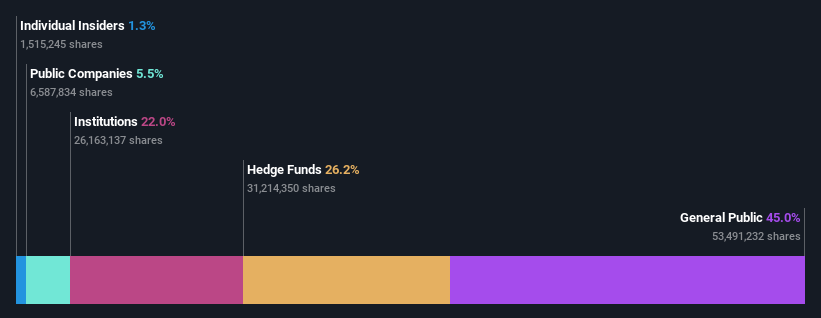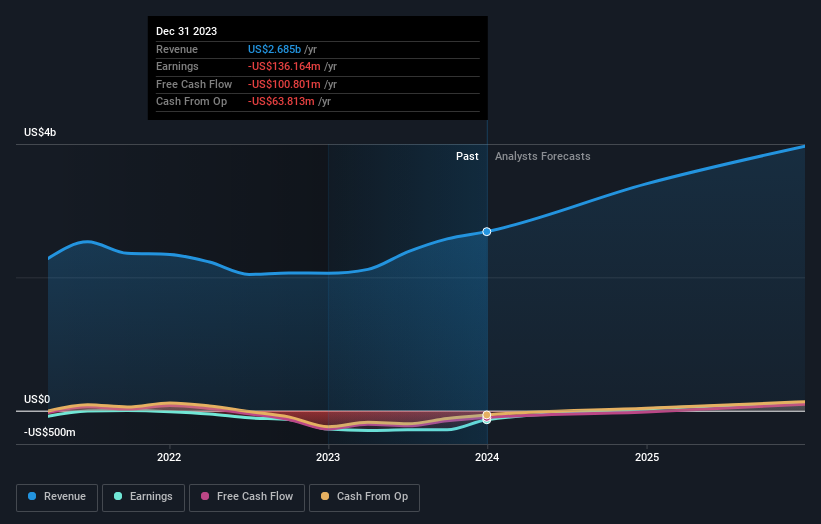While hedge funds own 26% of NFI Group Inc. (TSE:NFI), retail investors are its largest shareholders with 45% ownership
Key Insights
Significant control over NFI Group by retail investors implies that the general public has more power to influence management and governance-related decisions
The top 9 shareholders own 50% of the company
If you want to know who really controls NFI Group Inc. (TSE:NFI), then you'll have to look at the makeup of its share registry. And the group that holds the biggest piece of the pie are retail investors with 45% ownership. That is, the group stands to benefit the most if the stock rises (or lose the most if there is a downturn).
Hedge funds, on the other hand, account for 26% of the company's stockholders.
Let's take a closer look to see what the different types of shareholders can tell us about NFI Group.
See our latest analysis for NFI Group
What Does The Institutional Ownership Tell Us About NFI Group?
Institutions typically measure themselves against a benchmark when reporting to their own investors, so they often become more enthusiastic about a stock once it's included in a major index. We would expect most companies to have some institutions on the register, especially if they are growing.
We can see that NFI Group does have institutional investors; and they hold a good portion of the company's stock. This suggests some credibility amongst professional investors. But we can't rely on that fact alone since institutions make bad investments sometimes, just like everyone does. If multiple institutions change their view on a stock at the same time, you could see the share price drop fast. It's therefore worth looking at NFI Group's earnings history below. Of course, the future is what really matters.
Our data indicates that hedge funds own 26% of NFI Group. That's interesting, because hedge funds can be quite active and activist. Many look for medium term catalysts that will drive the share price higher. Coliseum Capital Management, LLC is currently the company's largest shareholder with 26% of shares outstanding. In comparison, the second and third largest shareholders hold about 7.9% and 5.5% of the stock.
We also observed that the top 9 shareholders account for more than half of the share register, with a few smaller shareholders to balance the interests of the larger ones to a certain extent.
While it makes sense to study institutional ownership data for a company, it also makes sense to study analyst sentiments to know which way the wind is blowing. Quite a few analysts cover the stock, so you could look into forecast growth quite easily.
Insider Ownership Of NFI Group
The definition of company insiders can be subjective and does vary between jurisdictions. Our data reflects individual insiders, capturing board members at the very least. The company management answer to the board and the latter should represent the interests of shareholders. Notably, sometimes top-level managers are on the board themselves.
Insider ownership is positive when it signals leadership are thinking like the true owners of the company. However, high insider ownership can also give immense power to a small group within the company. This can be negative in some circumstances.
Shareholders would probably be interested to learn that insiders own shares in NFI Group Inc.. As individuals, the insiders collectively own CA$17m worth of the CA$1.3b company. Some would say this shows alignment of interests between shareholders and the board. But it might be worth checking if those insiders have been selling.
General Public Ownership
The general public-- including retail investors -- own 45% stake in the company, and hence can't easily be ignored. This size of ownership, while considerable, may not be enough to change company policy if the decision is not in sync with other large shareholders.
Public Company Ownership
It appears to us that public companies own 5.5% of NFI Group. It's hard to say for sure but this suggests they have entwined business interests. This might be a strategic stake, so it's worth watching this space for changes in ownership.
Next Steps:
While it is well worth considering the different groups that own a company, there are other factors that are even more important. Consider risks, for instance. Every company has them, and we've spotted 2 warning signs for NFI Group you should know about.
If you are like me, you may want to think about whether this company will grow or shrink. Luckily, you can check this free report showing analyst forecasts for its future.
NB: Figures in this article are calculated using data from the last twelve months, which refer to the 12-month period ending on the last date of the month the financial statement is dated. This may not be consistent with full year annual report figures.
Have feedback on this article? Concerned about the content? Get in touch with us directly. Alternatively, email editorial-team (at) simplywallst.com.
This article by Simply Wall St is general in nature. We provide commentary based on historical data and analyst forecasts only using an unbiased methodology and our articles are not intended to be financial advice. It does not constitute a recommendation to buy or sell any stock, and does not take account of your objectives, or your financial situation. We aim to bring you long-term focused analysis driven by fundamental data. Note that our analysis may not factor in the latest price-sensitive company announcements or qualitative material. Simply Wall St has no position in any stocks mentioned.

 Yahoo Finance
Yahoo Finance 

